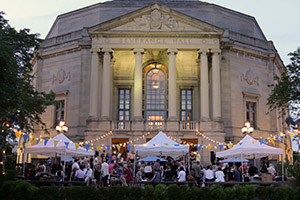by Daniel Hathaway
Two events are on the docket today, both at 7 pm.
Gearing up for their forthcoming European tour, Franz Welser-Möst and The Cleveland Orchestra will play two Austrian symphonies on the Summers at Severance series — Mozart’s 35th and Bruckner’s 4th. From August 26 through September 7, the Orchestra will play eight performances in six European cities: Berlin, Helsinki, Lucerne, Ansfelden, Bratislava, and Vienna.
And the Cleveland Museum of Art will present a Third Thursday at Transformer Station concert by the Aidan Plank Ensemble hosted by Ideastream Public Media radio personality Dan Polletta.
For details of these and other classical events, visit the ClevelandClassical.com Concert Listings.
ANNOUNCEMENTS:
The Cleveland Orchestra has received a $5 million gift from The Kelvin and Eleanor Smith Foundation in support of the Kelvin Smith Family Chair held by Music Director Franz Welser-Möst.
Ellen Stirn Mavec, President and Chairman of the foundation and granddaughter of the late Kelvin and Eleanor Smith said, “In 1979, my grandfather recognized and appreciated the artistic excellence of The Cleveland Orchestra and named the Music Director’s position with a generous gift. The Smith Foundation wishes to applaud Franz Welser-Möst’s impactful leadership with a meaningful gift honoring his longstanding commitment to Cleveland.”
All musical instruments need restoration from time to time, and carillons are no exception. The Friends of the McGaffin Carillon in University Circle have raised the funds to send its 47 bells and playing mechanism to the Netherlands for restoration and enhancement, including the casting of four new bells. A “Farewell to the Bells” concert on Friday, August 18 will feature carillonneurs George Leggiero, Keiran Cantilina, and Patrick Macoska performing music by Corelli, Gershwin, Joplin, Dvorak and others. The bells will be reinstalled in the spring.
TODAY’S ALMANAC:
On August 15, 1772, German inventor Johannes Nepomuk Maelzel, who developed the metronome, was born in Regensburg, and on that date in 1875, African British composer Samuel Coleridge Taylor entered the world in London, as did Russian inventor Leon Theremin, creator of the pioneering electronic instrument that bears his name, but in St. Petersburg in 1896.
Here’s a 2013 documentary about Samuel Coleridge-Taylor’s visits to the U.S. in 1904, 1906, and 1910, and his influence on the African American Civil Rights Movement.
Watch a historic video of Leon Theremin playing one of the first electronic instruments to enter the concert world, or another video of an extraordinary gathering of 273 Theremin players going for a Guinness World Record in Japan in 2013.
August 15 also marks the Feast of the Assumption in Catholic-leaning countries, the day when the Virgin Mary was bodily assumed into heaven according to the doctrine proclaimed by the Vatican in 1870. It’s a good day for parades (like the one in Cleveland’s Little Italy), but also a good occasion to enjoy a setting or two of the Magnjificat, the song that Mary impressively improvised in response to some surprising news brought by the Archangel Gabriel.
There are many listening possibilities, but here are three:
Johann Sebastian Bach composed wonderfully compact version in E-flat for his first Christmas in Leipzig, incorporating four little seasonal pieces into the traditional text (they were later removed to create the Magnificat in D). Here’s a performance by the Amsterdam Baroque Orchestra and Choir led by Ton Koopman in St. Thomas’ Church during Bachfest Leipzig 2002.
Charles Villiers Stanford’s Magnificat and Nunc Dimittis in G is a standard at Anglican Choral Evensong services, and assigns solo voices to the roles of Mary (a boy soprano, usually) and the agèd Simeon (a baritone). Follow along with the score in a 2010 performance by the Choir of St. John’s College, Cambridge here.
And for a striking recent setting, follow the score in a performance of Arvo Pärt’s Magnificat dating from 1989. Paul Hillier conducts the Estonian Chamber Choir.




